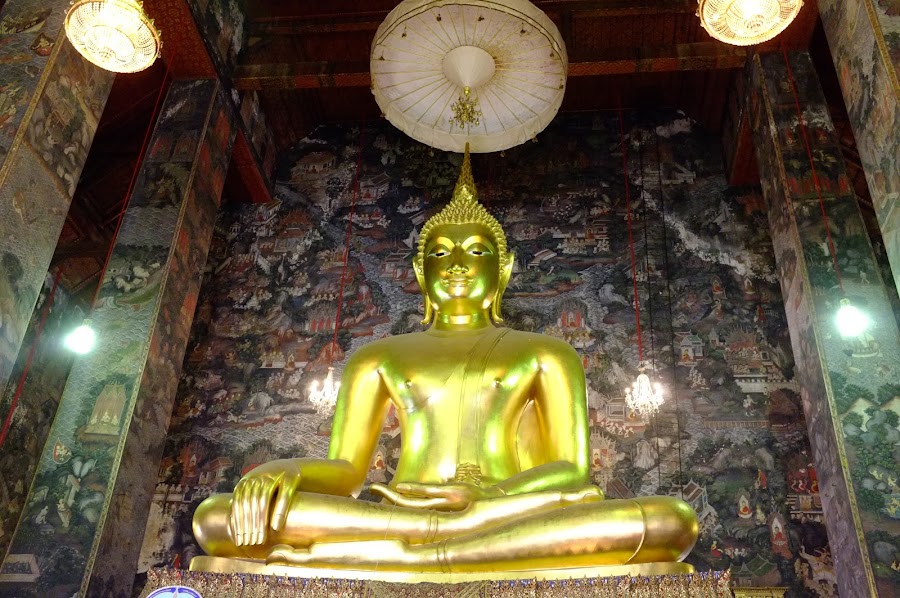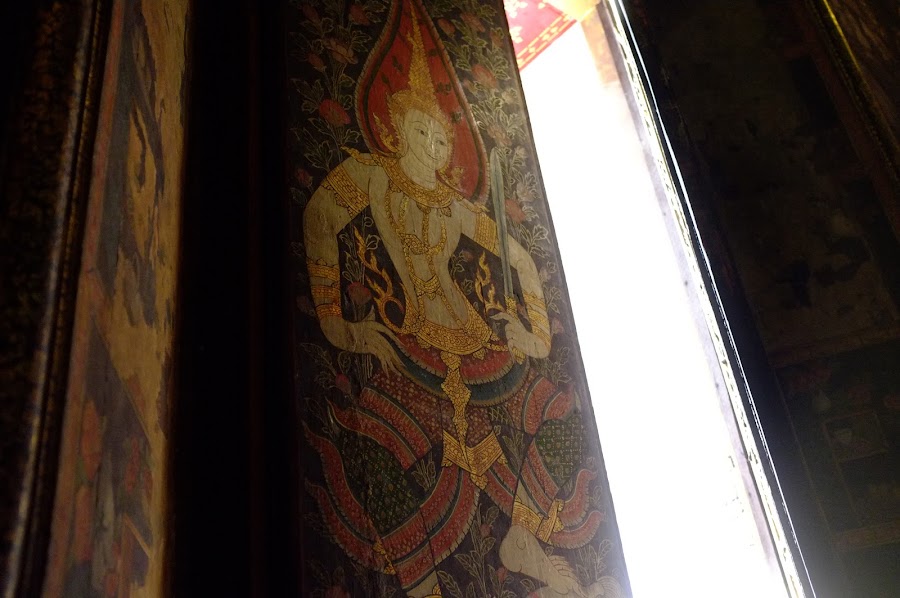
Despite having royal temple grade (the highest) Wat Suthat is relatively unknown and much less transited than neighbouring temples located closer to the riverbank, started by King Rama I in 1807, it's quite nice to visit given the lack of crowds. If you ask me, this is how temples should be explored.
Wat Suthat features Thailand's largest main chapel, where Phra Si Sakayamuni aka the largest (8m high) surviving Sukhothai style Buddha (from the 14th century) resides. It also features 28 chinese style pagodas surrounding the main building, as a representation of the 28 buddhas born in this World.
The most memorable piece though are the huge mural paintings that decorate the walls surrounding the Buddha and the use of Western style elements, like the clock above. Murals are extremely mesmerizing to me, as the technique used to connect different stories across the wall into a narrative thread seems nearly magical.
Jataka
Mural paintings are a common element on the walls of Thai temples and palaces. While we see the Ramakien myth depicted in the walls of the Grand palace, it is also common to have the paintings capture one of the 10 jatakas, or stories describing the ten final lives of the Bodisattva who would finally become Buddha. These are known in Thai as dasajāti jātaka ทศชาติชาดก. The last 10 lives capture the main virtues of renunciation, vigour, benevolence, absolute determination, insight, morality, patience, equanimity, reality and generosity. Usually the lower parts of the murals, capture Jataka scenes, while the life of the Buddha is depicted higher up.

Sadly the temple is under renovation so we cannot see the pagodas on the outside.

There are 156 Budhha images in Sukhothai style guarding the main one.

The small statue covered in gold leaf, which is put as offer - in case of pain, people put the golden square where it hurts.

Majestic yet calming view.

I noted the contrast between the scenery on the walls and the more nature-like elements of the doors.

This buddha surrounded by the 6-headed snake recalls the story of the Buddha and the serpent king Mucalinda, as the Buddha sat beneath a tree engrossed in meditation, Mucalinda came up from the roots of the tree to shield the Buddha from the rain that was just beginning to arise, so he would continue meditating.

Beautiful windows

I felt particularly intrigued by this sea scene, which I read could be related with the jataka that symbolizes the virtue of Perseverance: the story of Prince Mahajanaka who suffers a shipwreck and makes it through 7 days swimming in the ocean, till the Gods come to rescue him.

Below golden stupa is a cute little miniature of the Golden Mount, few blocks away.

On the side, we can still see some of the 28 chinese pagodas while continuing to the next building.

This is Phra Ubosot (1834), the longest ordination hall in Thailand.

As you walk around, these little doors guarded by 2 foreigner looking guys appear one after another. With perseverance, I found the only one which was open!



Just to sneek behind the vast amou t of monks praying.






















No comments
Post a Comment